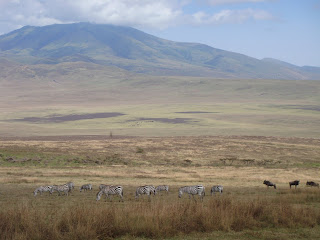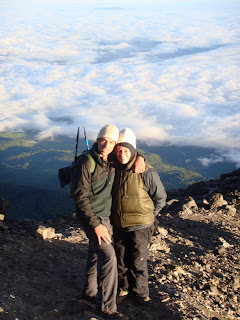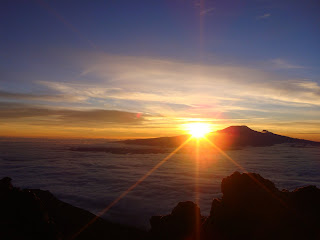Tanzania - History and Overview
During the early colonization of Tanzania the Germans introduced sisal (a plant used to make rope) in 1892, and marked the beginning of the territory's most valuable industry, which was assisted by the development of the railway from the new capital of Dar es Salaam to Lake Tanganyika. Another railway that ran from Tanga on the coast to Moshi on the lower slopes of Kilimanjaro promoted the growing of coffee in the latter's fertile climate. However, with German defeat in World War I, the German colony was short-lived and under the 1919 Treaty of Versailles, Britain received a League of Nations Mandate to administer the territory. The British policy was to rule indirectly through African leaders, and by 1926, Africans were admitted to the Legislative Council, which reported to the British Governor. In 1954, the Tanganyika African National Union (TANU) was founded by Julius Nyerere, who was known as "Mwalimu" ("teacher" in KiSwahili), not only because he was a former high school teacher, but also because he was a long-term advocate of the importance of literacy and education in promoting development in Tanzania. Since his student days, Nyerere pondered the meaning of democracy for Africa. In an essay titled "Ujamaa" he set out the belief that personal accumulation of wealth in the face of widespread poverty was anti-social. It further stated that Africa should strive to create a society based on mutual assistance and economic as well as political equality. By the late 1960's, Nyerere had embarked on African Socialist type of policies which were heavily influenced by the Chinese communist model. In 1965 TANU voted to scrap the multi-party model of democracy bequeathed to it by Britian. Nyerere argued that democracy was not synonymous with multiparty politics. He advocated free speech and the discussion of ideas but banned opposition parties saying 'The only socially defensible use of "we" is that which included the whole society. Voters were given a choice of candidates to vote for but they were all TANU party members. In 1967 the Arusha Declaration outlined the Tanzanian government's commitment to a socialist approach to development. The government vowed to reduce its dependence on foreign aid and instead foster a system of self-reliance. The declaration also announced the government takeover of industry and banking. Nyerere was himself fascinated with Chinese development economic strategies but dismissed fears that Tanzania was toying with Marxism either Chinese or Soviet style. In 1974 the government commenced what was called "villagization" which basically amounted to forcibly relocating 80% of its population to rural areas. The idea behind it was that agriculture was the engine of economic growth. A massive increase in production was to be accomplished through communal farming. The scheme created massive disruptions in national agricultural production and ultimately failed. New land was often infertile. Necessary equipment to cultivate crops was often unavailable. The local people did not want to work communally, they just wanted to provide for their own families. Government prices for crops were set artificially too low. As a result, revenue from cash crop exports did a full reversal and plummeted. As the economy spiraled downward in the 70's and 80's, the World Bank, IMF and various world aid partners called for a drastic structural adjustment to the economic system or they would suffer the consequences of being squeezed out of further bail out money. The IMF proposed a cure to their economic woes but Nyerere resisted and turned a deaf ear to them. As economic conditions continued to deteriorate dissension grew amon the government ranks. In 1985 Nyerere resigned. In 1986, the Tanzanian government submitted to the IMF terms. With the resignation of Nyerere, the great Tanzanian experiment with African socialism was over. Economic growth rates slipped into the negative around 1974, where they languished for the next 25 years. By 1985, earnings from exports covered only a third of its import bill. The government was forced to borrow money to cover the rest. And so beginning as early as the late 70's Tanzania began to accumulate a crippling burden of debt from which it has not yet been able to escape. Part of the strucural adjustment aid program was the re-introduction of a western-style multiparty democracy in 1992. In 2005, Jakaya Kilwete was elected president with 80% of the popular vote.
With the cooperation of the British, Tanganyika was granted full independence in 1961 with Nyerere as president. In 1963, Zanzibar achieved independence from Britain in the form of a constitutional monarchy under the Sultan, but a popular revolt in 1964 against the Sultan soon led to the unification of Zanzibar with Tanganyika to form the United Republic of Tanzania. The Sultan was replaced by the Afro-Shirazi Party on Zanzibar. Nyerere was enthusiastic about the welfare of his people and had great visions for the future, but his policies were often misguided and unrealistic. Tanzania took another knock when Uganda invaded the northern regions in 1978. The invasion could have been a result of Tanzania's support of exiled groups who were hostile to Idi Amin's regime, but more likely it was simply a diversion by Amin to prevent mutiny in his own country. It took months for Tanzanians to mobilize an army but when they did, they successfully pushed out the Ugandan forces, which led to a quick defeat of Amin's government in Uganda and the exile of the dictator. Despite his failures, Nyerere was a larger-than-life person, seemingly incorruptible and was liked by the people. He's still today referred to as the "Father of the Nation." He was a committed Pan-Africanist and his foreign policies supported the liberation struggles in (among others) Mozambique, South Africa, and Zimbabwe.
Ali Hassan Mwinyi became president of Tanzania in 1985, and retained control until multi-party elections in 1995, which TANU/CCM won comfortably; Benjamin Mkapa was sworn in as president. The official capital of Tanzania moved from Dar es Salaam to Dodoma in the middle of the country in 1996, but since then the officialdom has been slow to make the move as Dodoma is literally in the middle of nowhere. In 2005, Jakaya Mrisho Kikwete was elected the fourth president of the country. While being part of the overall government, Zanzibar is semi-autonomous and the Zanzibar House of Representatives can make laws for Zanzibar without the approval of the government as long as it does not involve union-designated matters. Interestingly, Tanzania's constitution allows for 20% of the seats of the party in power to be allocated to women.
Although many people live below the poverty line, Tanzania's economy has grown steadily and successfully in recent years. However, it has come under pressure from the influx of refugees from conflicts in Rwanda, Burundi, Somalia, and the Democratic Republic of Congo, which has swelled Tanzania's population by 1 million and has had a serious impact on the environment around the refugee camps in the north of the country. With the need for food, water, and fuel, wildlife has been depleted, trees have been chopped down, and the land is now suffering from semi-desert conditions.
. Read more...

































































































